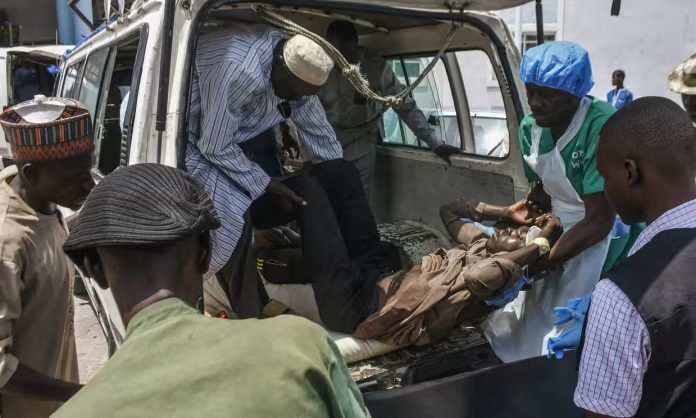The town of Gwozo, in Nigeria’s Borno State, was on Saturday the scene of three suicide bombing attacks that killed 32 and injured more than 40. The attacks targeted a wedding, Gwoza hospital, and a funeral for one of the wedding victims. As of yet, the attack has not been claimed by any terrorist group active in the region such as Boko Haram, Ansaru, or ISIS-West Africa (ISIS-WA).
What You Need to Know
According to Borno State Police Spokesperson Nahum Kenneth Daso, “At about 3:45pm [on Saturday, June 29th] a woman carrying a baby on her back detonated an Improvised Explosive Device (IED) she had on her at a crowded motor park.”
The Borno State Emergency Management Agency (SEMA) in a statement on June 29th announced the occurrence of two more attacks, saying “Another bomb blast occurred at General Hospital Gwoza, in the midst of sorrow, the people in the community gathered for the funeral congregation of the deceased people who died, another suicide bomber denoted a bomb.”
According to SEMA, the blast victims were initially treated at a Medical Regimental Services (MRS) clinic before being transported to the capital of Borno State, Maiduguri, for additional treatment.
Thus far, the United States’ Embassy in Nigeria, Amnesty International, and the United Nations have condemned the attack, with Nigerian President Bola Tinubu expressing that “The purveyors of wanton violence shall have a certain encounter with justice.”
So, What Now?
Boko Haram, one of Nigeria’s most violent Islamic militant groups, has not yet laid claim to the attack. Despite this, the attack likely has links to the group, as it utilizes female bombers prolifically to hit civilian targets.
According to academics Hillary Matfess and Jason Warner, “Over time, the threat from female suicide bombers has become so pervasive that, according to residents of Maiduguri, the CJTF [Civilian Joint Task Force] has at times instituted an “unofficial curfew” for women, preventing them from moving freely within the city between 7:00 p.m. and 7:00 a.m..”
Additionally, Matfess and Warner have noted that Boko Haram’s ‘suicide bomber profile’ is profoundly unique, with female bombers constituting 56 percent of all suicide attacks committed by the group between 2011 and 2018. The rationale behind the use of the female bombers is due to the woman’s ability to move more freely in civilian areas, without fear of being body checked by security services. Clothing such as burqas and Niqabs enable women to hide explosive vests, although as seen in the attack on the wedding, infants, strapped to the attackers body, are sometimes used to hide the explosive vest or belt.

